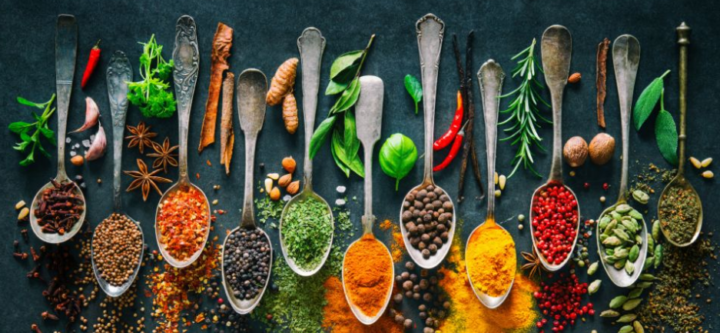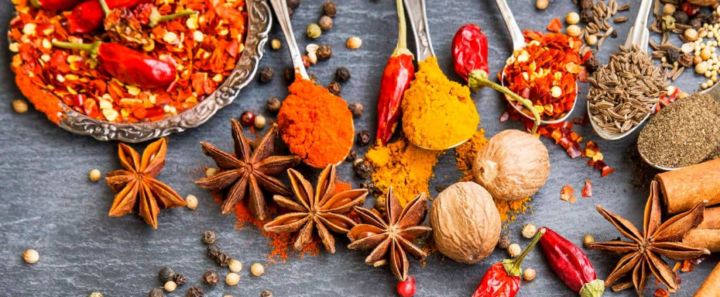Hi there, foodie fam!
Welcome to your ultimate guide to Nigerian herbs and spices and how to use them in cooking.
More importantly, I welcome you to Sundry Agro kitchen, where every pot tells a story, and every leaf has a purpose. I’m Christianah, – a lifelong lover of anything that smells like home — from that first whiff of hot ogbono soup to the gentle steam rising from freshly pounded yam.
Today, I want to take you on a flavour-packed journey into the world of Nigerian herbs and spices, the real MVPs behind our unforgettable dishes.
Let’s face it: without spices, Nigerian food would just be boiled vibes. Whether you’re frying stew in a cramped Lagos kitchen or making pepper soup for that uncle who claims he’s “watching his weight” (but takes three rounds), what truly gives our meals that legendary taste are the herbs, the roots, the leaves, and the seeds our mothers, aunties, and grandmothers have been using for generations.

From the rich aroma of egusi bubbling in a pot, to that pepper soup that clears your sinuses and your heartbreak, what really brings Nigerian food to life are our herbs and spices.
And no, it’s not just about adding Maggi and hoping for the best.
You see, for me, behind every unforgettable Nigerian dish is a blend of local seasonings; some fresh from your grandma’s garden, others from neighborhood shawa woman at Mile 12.
These herbs and spices are not only used to flavor our soups, stews, and rice dishes; many of them have real health benefits. We’re talking anti-inflammatory, immune-boosting, digestion-aiding, and even romance-enhancing properties (hello, Uda 👀).

But Why Should You Care?
Simple, they’re not just about taste.
In Nigeria, herbs and spices are life.
They’re medicine, they’re culture, they’re tradition, and yes, they’re vibes.
Before anyone ever heard of multivitamins, we were already boosting immunity with scent leaf, cleansing the body with bitter leaf, and chasing away malaria with dongoyaro tea. From Yoruba agbo to Igbo ncha, and Hausa zobo mixes; these plants were (and still are) our first doctors.
And don’t even get me started on the culinary genius — the way Uziza, Uda, and Ehuru transform a simple soup into a five-star experience. Or how thyme and curry made their way into our Sunday rice legacy.
Also, according to Chef Tolu Eros, popularly known as The Billionaire Chef,
“Nigerian herbs and spices are the soul of our cuisine. Once you understand them, you unlock a world of flavour and healing passed down from our grandmothers.”
Chef Eros isn’t lying. In fact, before modern medicine, your great-grandma was already treating malaria with dogonyaro, stomach pain with scent leaf, and stress with ugu smoothie (okay, maybe not the smoothie part).
And now that more Lagosians are becoming wellness-conscious (and tired of bland fast food), there’s a renewed interest in going back to our roots. Literally.
So whether you’re a home cook trying to upgrade your stew game, a foodie chasing flavour, or just wondering what on earth Uziza actually does — you’ve come to the right place.
So, What’s in This Nigerian Herbs and Spices Guide for You?
This is not just another blog post. This is your ultimate guide to Nigerian herbs and spices, the full gist, no gatekeeping. In this guide, we’ll explore:
- A carefully curated list of popular Nigerian herbs and spices
- Their health benefits and why your body needs them
- The foods and dishes they’re commonly used in
- Pro tips on how to combine and cook with them
- Some cultural gems and mama’s secrets passed down through generations
Whether you’re a beginner cook, a food blogger, a health-conscious millennial, or a curious lover of Nigerian cuisine, this guide to Nigerian herbs and spices will help you step up your seasoning game and fall in love with the roots of our food culture.
So roll up your sleeves (or your buba), and let’s open the spice cabinet of Nigeria, from Bauchi to Benin, Port Harcourt to Ibadan, we’re about to pepper dem, the traditional way!

III. Common Nigerian Herbs and Their Benefits
Below is a rich, detailed table that covers the name, local name (where applicable), health benefits, and foods they’re commonly used in. I’ve included your 30 ingredients — and even a few more — to make this a go-to guide for Nigerians who love good food and good health.
| Herb/Spice | Local Name(s) | Health Benefits | Commonly Used In |
|---|---|---|---|
| Locust Beans | Iru, Ogiri okpei, Dawadawa | Aids digestion, boosts immune system | Egusi soup, Ogbono, Ofada sauce |
| Scent Leaves | Nchuanwu, Efirin, Daidoya | Antibacterial, antifungal, supports digestion | Pepper soup, Jollof rice, Native soup |
| Achi | Thickener (from Brachystegia eurycoma) | Source of fiber, aids digestion | Ofe Achi, Nsala soup |
| Ground Dried Crayfish | N/A | Protein-rich, enhances taste | Stews, Soups, Sauces |
| Iyere | African Black Pepper | Anti-inflammatory, relieves stomach issues | Herbal teas, pepper soup |
| Partminger | Unknown origin, aromatic herb | Fragrant, soothing, may aid digestion | Native jollof rice, palm oil rice |
| Garlic | Ayu | Heart health, antibacterial, lowers cholesterol | Marinades, stews, herbal mixtures |
| Ginger | Cithar | Anti-nausea, anti-inflammatory, boosts immunity | Zobo, tea, meat seasoning, pepper soup |
| Alligator Pepper | Atare | Aphrodisiac, antimicrobial, digestion support | Traditional medicine, soups, kola ritual |
| Ehuru | Calabash nutmeg, African nutmeg | Stimulates appetite, relieves indigestion | Pepper soup, ofe nsala, sauces |
| Curry Powder | N/A | Adds aroma, antimicrobial properties (depending on blend) | Fried rice, stews, jollof rice |
| Thyme | N/A | Antioxidant, boosts immunity | Stews, Jollof, Fried rice |
| Bay Leaf | N/A | Aids digestion, relieves bloating | Jollof rice, stew, meat broth |
| Cameroon Pepper | N/A | High in capsaicin, pain relief, boosts metabolism | Suya spice, jollof, grilled meat |
| Onions | Alubosa | Rich in antioxidants, heart health | Everything — stews, soups, sauces |
| Dried Herring | Shawa, Bonga Fish | Rich in omega-3, enhances umami flavour | Native soups, yam porridge |
| Spring Onions | N/A | Digestive aid, mild onion taste | Fried rice, stir-fries, jollof |
| Cloves | Kanafuru | Natural preservative, relieves toothache | Zobo, pepper soup, suya spice |
| Aniseed | N/A | Aids digestion, good for coughs | Herbal drinks, teas, spice blends |
| Nutmeg | Aridan (misused name), true nutmeg | Soothes nerves, aids sleep and digestion | Moi moi, zobo, pastries, some soups |
| Ogiri | Ogiri Igbo, fermented locust seed | Probiotic benefits, deep umami flavour | Oha soup, bitterleaf soup, egusi |
| Groundnut Paste | N/A | High in protein, energy booster | Groundnut soup, sauces |
| Chili Powder | Ata gun | Boosts metabolism, adds heat | Stews, suya mix, marinades |
| Cumin | N/A | Rich in iron, aids digestion | Suya spice, seasoning blends |
| Yaji | Suya spice mix | Digestive aid, boosts appetite | Suya, grilled chicken, kebabs |
| Shallot | N/A | Similar to onions, but milder and sweeter | Sauces, marinades, jollof |
| Paprika | N/A | Antioxidant-rich, mild pepper flavour | Seasoning blends, fried rice, spice rubs |
| Black Pepper | Uziza seed (similar but distinct) | Antioxidant, improves nutrient absorption | Pepper soups, meat seasoning |
| Potash | Akanwu, Kaun | Softens food, acts as thickener (use sparingly) | Okra soup, Ewedu, beans porridge |
Expert Tip:
“You can’t talk about Nigerian herbs without talking about balance,” says Chef Bukky George-Taylor, founder of Taste Naija Collective.
“Too much iru? It ruins the pot. Too little? No soul. Our herbs need harmony, not just quantity.”
What’s the difference between scent leaf and uziza leaf?
Popular Nigerian Dishes That Use Nigerian Herbs and Spices
When it comes to Nigerian cooking, flavor is non-negotiable. Whether it’s smoky jollof rice that turns heads at owambes or a pepper soup that clears both your nose and your doubts, the magic lies in how we layer herbs and spices like seasoned pros.
Below, we’ll explore some of the most iconic Nigerian dishes, highlighting the key herbs and spices used in each one — and why they matter.
1. Jollof Rice (a.k.a. Naija’s National Anthem)
Key Spices/Herbs:
- Curry powder
- Thyme
- Bay leaf
- Ginger
- Garlic
- Onions (loads of it!)
- Cameroon pepper (for those that like their jollof with a little fire)
Why it slaps:
The combination of curry and thyme gives jollof its warm aroma, while the Cameroon pepper and garlic bring the heat and depth. Don’t forget that smoky flavour from firewood or “bottom pot” (party rice vibes!).
“If your jollof isn’t making people pause mid-conversation, check your seasoning.” — Chef Toun Balogun, Jollof Queen of Surulere
2. Egusi Soup
Key Spices/Herbs:
- Locust beans (iru)
- Crayfish
- Scent leaf or ugu
- Ground dry pepper
- Ogiri (optional, but authentic!)
Why it’s a classic:
That earthy flavour from crayfish and iru? Legendary. The greens bring freshness and a touch of health. It’s hearty, rich, and very “swallow-worthy.”
3. Ofada Sauce (Ayamase)
Key Spices/Herbs:
- Locust beans
- Green bell peppers
- Atarodo (scotch bonnet)
- Onions
- Seasoning cubes
- Crayfish
- Ogiri
Why people queue up for it:
That funky, deep flavour comes from generous amounts of locust beans, ogiri, and the unique blend of green pepper base. Served with Ofada rice on banana leaves. This one’s not for the faint of heart. Or the spice-shy.
4. Pepper Soup (Goat meat, Catfish, Chicken, etc.)
Key Spices/Herbs:
- Calabash nutmeg (Ehuru)
- Alligator pepper (Atare)
- Uda (Negro pepper)
- Scent leaf
- Ginger
- Garlic
- Uziza leaves (optional)
Why it heals body and soul:
This is Nigeria’s version of “get well soon.” All the spices work together to clear sinuses, warm the chest, and add that sweet-spicy afterburn. Add a cold drink? Game over.
“We don’t just eat pepper soup. We use it to restart our system.” — Mama Nkechi, roadside pepper soup specialist in Ajah
5. Oha Soup
Key Spices/Herbs:
- Oha leaves
- Uziza
- Crayfish
- Ogiri
- Palm oil
- Maggi crayfish or traditional seasoning
Why it’s special:
The fragrance from uziza, the tender Oha leaves, and that hit of fermented ogiri make it unforgettable. A taste of home for every Easter, Christmas, and anytime mummy visits from the East.
6. Fisherman Soup (Especially Rivers/Delta Style)
Key Spices/Herbs:
- Uziza leaf and seeds
- Calabash nutmeg (Ehuru)
- Crayfish
- Cameroon pepper
- Fresh pepper
- Scent leaf
- Thyme and curry (sometimes added for fusion flair)
Why it’s elite:
A fresh, sea-flavoured medley that allows the herbs and spices to shine through the fish and seafood base. This is where “fresh and spicy” go hand-in-hand.
7. Yam Porridge (Asaro)
Key Spices/Herbs:
- Onions
- Crayfish
- Cameroon pepper
- Curry powder
- Scent leaf or ugwu
- Palm oil
Why we love it:
Soft yam, coated in a spicy, slightly smoky sauce with just the right kick. Add crayfish and a touch of Cameroon pepper and you’re officially a pro.
8. Grilled Chicken / Turkey (Party style)
Key Spices/Herbs:
- Yaji (suya spice)
- Paprika
- Thyme
- Curry
- Garlic
- Ginger
- Onion powder
Why it’s irresistible:
It’s all in the marinade. These meats are usually soaked overnight in spice blends, then grilled to perfection. The outside? Crispy and spicy. The inside? Juicy like gossip.
9. Afang Soup
Key Spices/Herbs:
- Afang leaves (okazi)
- Waterleaf
- Crayfish
- Periwinkle
- Palm oil
- Dry fish
- Seasoning cubes
Why it’s a favourite:
This Calabar/Cross River legend balances bitterness from Afang with sweetness from waterleaf and depth from crayfish and fish. Trust me, it’s a vibe.
10. Moi Moi & Akara
Key Spices/Herbs:
- Ground crayfish
- Onions
- Fresh pepper
- Ginger
- Garlic
- Nutmeg (for moi moi)
Why it works:
Even simple dishes like this shine when onions, crayfish, and nutmeg come in. Nutmeg in moi moi? Small touch, big difference.
Summary Table of Dishes vs Nigerian herbs and Spices
| Dish | Notable Spices/Herbs |
|---|---|
| Jollof Rice | Curry, thyme, bay leaf, Cameroon pepper |
| Egusi Soup | Locust beans, crayfish, scent leaf, ogiri |
| Ofada Sauce | Locust beans, atarodo, onions, ogiri |
| Pepper Soup | Ehuru, atare, uda, scent leaf |
| Oha Soup | Uziza, ogiri, crayfish, oha leaves |
| Fisherman Soup | Uziza, crayfish, scent leaf, ehuru |
| Yam Porridge | Cameroon pepper, crayfish, scent leaf |
| Grilled Chicken | Yaji, paprika, garlic, ginger |
| Afang Soup | Afang leaves, crayfish, dry fish |
| Moi Moi & Akara | Crayfish, onions, nutmeg |
Watch how Chef Amakaa used scent leaves in mackerel fish pepper soup

Modern Uses of Nigerian Herbs and Spices (Beyond the Kitchen)
Let’s be honest, herbs and spices in Nigeria are more than just “food enhancers.” Our grandmothers knew it. Our mothers confirmed it. And now, even Gen Z is jumping on the “plant-based, organic, herbal tea” train like it’s a new trend (but we know say we don dey do am since ’99).
In this section, we’ll explore how Nigerian herbs and spices are used in modern life — not just in food, but also in wellness, skincare, beauty routines, detox plans, and even home remedies your aunt swears by.
1. Herbal Teas & Detox Drinks
Remember zobo? It’s not just a party drink anymore. Nigerian herbs are the new superstars of clean living and wellness trends.
- Zobo Leaves (Hibiscus): Rich in antioxidants. Great for blood pressure, digestion, and skin glow. Add ginger, cloves, and pineapple peels for a detoxifying blend.
- Scent Leaf Tea: Anti-inflammatory and antibacterial. Nigerians now brew it like green tea, especially for coughs, bloating, and stomach issues.
- Lemongrass + Ginger Infusion: Common in many Nigerian homes now for detox, weight loss, and relaxation.
- Alligator Pepper + Clove water: Not for the faint-hearted, but this combo is used in some homes for spiritual cleansing, digestion, and fertility rituals (don’t say I didn’t warn you ).
“Before you buy foreign detox powders, try boiling ginger and uziza at home. Your belly will thank you!” — Amaka Umeh, Herbal Wellness Coach, Lekki
2. Skincare & Natural Beauty Remedies
African herbs and spices have long been used to keep skin popping. But now, they’re being bottled and branded by beauty startups across Lagos and Abuja. From DIY masks to oil infusions, here are a few trending uses:
- Turmeric (yes, we use it too): Used with honey for face masks to fight acne and hyperpigmentation.
- Cloves (Kanafuru): Now used in infused oils and soaps to treat pimples and hair dandruff.
- Garlic & Ginger Paste: Used for anti-inflammatory skin treatments, especially in stubborn fungal areas (we’re not playing with ringworm).
- Cameroon Pepper + Coconut Oil: Weird combo? Maybe. But some naturalistas swear it stimulates hair growth when used carefully on the scalp!
3. Traditional Healing and Spiritual Uses
You didn’t grow up in Nigeria if you’ve never seen your aunty boil herbs in a big black pot for “steam therapy.” Herbs like scent leaf, bitter leaf, uziza, atare, and bay leaf have been used for:
- Steam Inhalation (Inhaler 1.0): To clear catarrh, cough, or just “press your chest” during harmattan.
- Alagbo bitters: Locally made herbal concoctions (bitter as your ex) used for cleansing the system, especially after childbirth or overfeeding during Christmas.
- Spiritual Baths: Some people use alligator pepper, camphor, scent leaf, and salt water for spiritual cleansing or protection rituals.
“Before we had antibiotics, we had bitter leaf. Before Dettol, we had hot water and uziza.” — Iya Alagbo, Traditional Healer, Mushin Market
4. Household Use & Aromatherapy
Some Nigerian herbs are now used in natural air fresheners, mosquito repellents, or essential oil diffusers:
- Bay Leaf Burn: Burnt slightly on the gas or charcoal to chase away insects and calm anxiety (and possibly your mother-in-law).
- Dried Orange Peel + Clove Sachets: Used as homemade air fresheners in wardrobes or cars.
- Lemongrass & Basil (Efirin) oil infusions: Used as DIY insect repellents or for a calming home scent.
5. Supplements & Modern Health Products
Now more than ever, you’ll find Nigerian herbs in:
- Capsules and Powders: Moringa, turmeric, ginger, garlic — now available in capsules for easy digestion.
- Spice Blends for Weight Loss: Yaji + cayenne pepper + black pepper blends are sold as fat-burners (paired with skipping ropes and hope).
- Cold-Pressed Oils: From garlic oil to clove oil and scent leaf oil. Nigerian brands are cashing in big time on what our grandmas used for free.
6. E-Commerce & Nigerian Wellness Brand
From Abuja to Instagram, Nigerian entrepreneurs are packaging our spices and herbs into neat jars and bottles, ready for international export or local delivery.
Brands like:
- Herbal Healing Hub (Abuja)
- The Scent Leaf Co. (Lagos)
- Owanbe Organics
- Alagbo.ng
…are proving that you can go global with local ingredients.
Herbs and spices in Nigeria are not just for cooking soup and stew. They’re part of our identity, wellness, skincare routine, and even our hustle. Whether it’s zobo tea in Lekki or ogiri in Nsukka, our traditional spices are staying relevant in modern Nigerian living.
You might say, “Na food, na medicine, na lifestyle.”
Using Nigerian Herbs and Spices Effectively
Nigerian cooking isn’t just about knowing your ingredients; it’s about how you use them. Timing, technique, and even the container you store your spices in can make or break that rich pot of egusi or ogbono. Below are chef-approved tips to get the best taste, aroma, and even medicinal value out of your herbs and spices.
1. Grinding vs. Pounding: Which One and Why?
- Pounding (using a mortar and pestle) is the traditional method — and let’s be honest, it unlocks flavour like no blender can. When you pound ogiri, locust beans, or pepper, you don’t just grind — you crush the oils out, and that adds extra depth.
- Grinding (dry mill or blender) is more convenient, especially for bulk processing. But be careful not to overheat the spices in an electric grinder. When ginger or cloves get too hot, they lose potency.
Chef’s tip: Use pounding for smaller, delicate spices like ata rodo and scent leaves. Use grinding for dry mixes like yaji, suya spice, or curry blends.
2. Storage Best Practices
Nigerian spices can go bad if you don’t store them properly — especially those with natural oils like iru (locust beans), ogiri, or even dried crayfish.
- Keep in airtight containers. Exposure to air kills the aroma faster than harmattan kills your skin moisture.
- Avoid plastic containers for oily spices. Glass jars or tins work better.
- Store away from heat and sunlight. Put them in a cool, dry cupboard, not on top of the gas or near the window. Let’s not cook them twice, biko.
- Freeze what can spoil. Iru, ogiri, crayfish, and dried fish? Wrap them in nylon and freeze.
“I lost 3k worth of iru last month to ‘soup smell’ because I left it in the fridge door. My ancestors were definitely disappointed.” — Shade Afolabi, Home Chef & Spice Vendor, Ikorodu
3. Fresh vs. Dried Leaf Use: Which One Hits Better?
Let’s settle this once and for all:
- Fresh leaves (like scent leaf, curry leaf, basil, uziza leaf) give off a stronger aroma and better nutrient content — best added towards the end of cooking.
- Dried leaves (especially for uziza, bay leaf, or bitter leaf) are easier to store, last longer, and often give a more concentrated, earthy flavor when simmered properly.
Pro Tip: Don’t boil fresh herbs for too long. You’ll just be boiling your flavour away. Always add fresh herbs in the last 5–10 minutes of cooking for full effect.
4. Combining Herbs Without Overpowering Dishes
You don’t need to throw 10 spices into one pot. Nigerian food is rich in flavour already — the key is balance.
Nigerian Herbs and Spices Quick Do’s & Don’ts:
Do pair thyme + curry + garlic in jollof rice or fried rice — perfect trio.
Don’t mix ogiri + iru + crayfish + atariko + turmeric in one soup. Your nose will enter coma.
Do use cloves + ginger + scent leaf for pepper soup — gentle, healing flavour.
Don’t add bay leaf + uziza + curry leaf + efirin + lemongrass into egusi. That’s not cooking. That’s fighting.
Expert advice:
“Every spice has a ‘best friend’. Don’t pair all the uncles and aunties in one soup pot.”
— Chef Stanley Okonkwo, Owner of AfroFusion Kitchen, Abuja
Bonus Tip: Know When to Add What
- Start of cooking: Add spices like thyme, curry, garlic, onion — they need time to bloom.
- Middle: Add crayfish, ogiri, pepper, bay leaf.
- End: Add fresh leaves, uziza leaf, scent leaf, and extra atarodo (if you like fire).
Nigerian Herbs and spices are like music. Some play the drums (pepper), some hum in the background (bay leaf), some take centre stage (crayfish), while some act like the hype man (onions). Use them well, and your pot will sing.
Celebrating Our Roots, One Spice at a Time
if Nigerian food were a person, herbs and spices would be the charisma. From the sizzling scent of suya spice on a Friday night to the soul-hugging aroma of ogbono with uziza leaf, our spices aren’t just ingredients. They are storytellers, healers, and keepers of our heritage.
Each time you pound iru, sprinkle yaji, or toss some efirin into the pot, you’re continuing a legacy that’s been passed down from our grandmothers’ clay pots to our modern-day stainless steel pressure cookers.
Our herbs and spices are not just there to “pepper dem”, they connect us to our roots, regions, and rituals. They remind us of home, even when we’re far away. They heal, preserve, flavour, and above all — bring us together at the table.
“If you want to know a Nigerian, taste their food. If you want to understand them, ask what’s in their spice rack.” — Chef Funmi Adeyanju, Culinary Historian, Lagos.
Nigerian herbs and Spice; Go Traditional, Go Bold
Don’t wait until December to try scent leaf in your rice or sprinkle ataiko in your banga soup. That “grandma-only” spice might just become your new go-to.
Experiment with spices from other tribes, too. An Igbo person can fall in love with Northern yaji, and a Yoruba cook can enjoy the delicate magic of ogiri okpei. It’s all about taste tourism — without leaving your kitchen.
Try Something New This Week!
Let’s make this fun. This week, pick one new herb or spice from this guide that you’ve never used before. Cook with it, taste it, and tell someone about it (or better still, show us on social media, we are there too).
Did you try dried aniseed in your stew? Add paprika to your fried yam? Use curry leaves fresh instead of dry? Whatever you do, make it Nigerian and make it proud.
Tag your cooking photos with #NaijaHerbChallenge and let’s celebrate our food heritage together.
Over to You on Nigerian Herbs and Spices
What herb reminds you of childhood?
Which spice do you swear by when guests are coming over?
What’s one “weird” combo that surprisingly works?
Let’s gist in the comments. I’ll be there — apron on, spoon in hand.
Until the next pot of inspiration,
Your spice-loving, food-swooning, proudly Naija chef.

